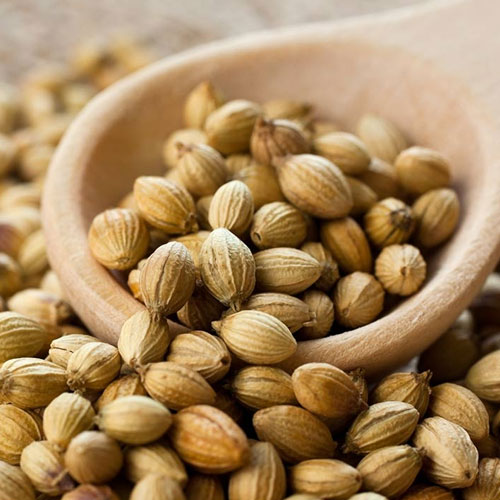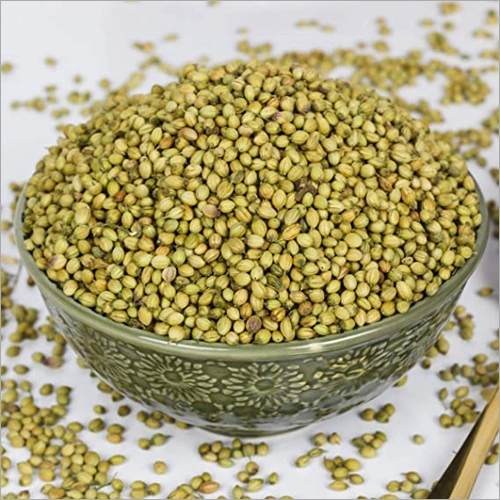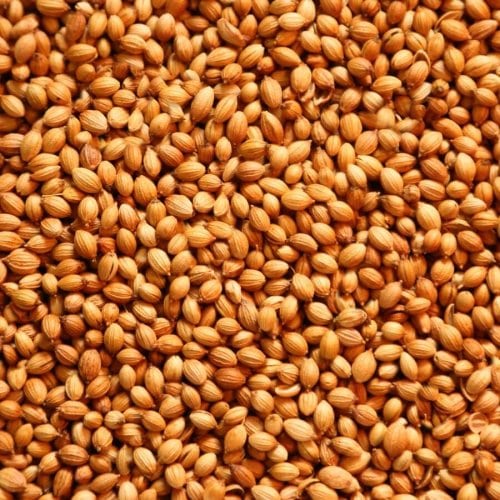CORIANDER
PRODUCT DESCRIPTION
GLOBAL MARKET DEMAND
SPECIFICATION
INGREDIENTS
USES & BENEFITS
CORIANDER
Coriandrum sativum, colloquially known as coriander, originated in Italy but is today cultivated widely in The Netherlands, Central and Eastern Europe (Russia, Hungary, and Holland), the Mediterranean (Morocco, Malta, and Egypt), North Africa, China, India, and Bangladesh [17–20]. All parts of the plant are edible, but the fresh leaves and dried seeds are commonly used in cooking in India .Coriander seeds are plump and usually brown and green in colour . They have a hollow cavity which bears essential oils that flavour of the dishes when used in cooking. Ground coriander is best for the dishes where you want the spice to be the flavour ,but not texture.
GLOBAL MARKET DEMAND
India exports most of it’s Coriander seeds to United States, Malaysia and United Arab Emirates and is the largest exporter of Coriander seeds in the World. The top 3 exporters of Coriander seeds are India with 36,403 shipments followed by Italy with 6,459 and Netherlands at the 3rd spot with 2,981 shipments.
SPECIFICATION
| Product Name | Coriander seeds |
|---|---|
| Origin | Italy |
| Family | Apiaceae |
| Binomial name | Coriander santivum |
INGREDIENTS
| Principle | Nutrient Value | Percent of RDA |
| Energy | 298 Kcal | 15% |
| Carbohydrates | 54.99 g | 42% |
| Protein | 12.37 g | 22% |
| Total Fat | 17.77 g | 60% |
| Cholesterol | 0 mg | 0% |
| Dietary Fiber | 41.9 g | 110% |
| Vitamins | ||
| Folates | 1 µg | <1% |
| Niacin | 2.130 mg | 13% |
| Riboflavin | 0.290 mg | 22% |
| Thiamin | 0.239 mg | 20% |
| Vitamin A | 0 IU | 0% |
| Vitamin C | 21 mg | 35% |
| Electrolytes | ||
| Sodium | 35 mg | 2% |
| Potassium | 1267 mg | 27% |
| Minerals | ||
| Calcium | 709 mg | 71% |
| Copper | 0.975 mg | 108% |
| Iron | 16.32 mg | 204% |
| Magnesium | 330 mg | 83% |
| Manganese | 1.900 mg | 82% |
| Phosphorus | 409 mg | 39% |
| Zinc | 4.70 mg | 43% |
USES & Health Benefits
- All parts of the plant are edible, but the fresh leaves and dried seeds are commonly used in cooking in India and Pakistan.
- In addition to its culinary use, the coriander seed possesses medicinal properties and has been used since time immemorial to treat disorders of the digestive, respiratory, and urinary systems, as it has diaphoretic, diuretic, carminative, and stimulant effects .
- Coriander leaves and seeds are full of vitamin K, which plays an important role in helping your blood clot.
- Coriander is full of antioxidants, which are important for fighting free radicals in your body.
- Coriander seeds have been shown to significantly lower blood sugar in people who have diabetes.





